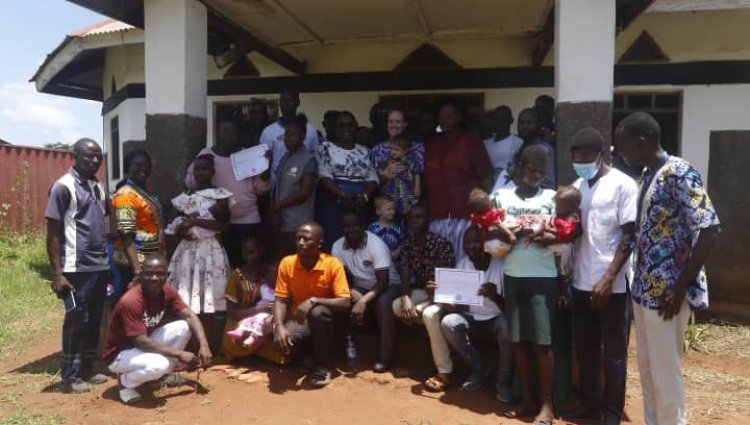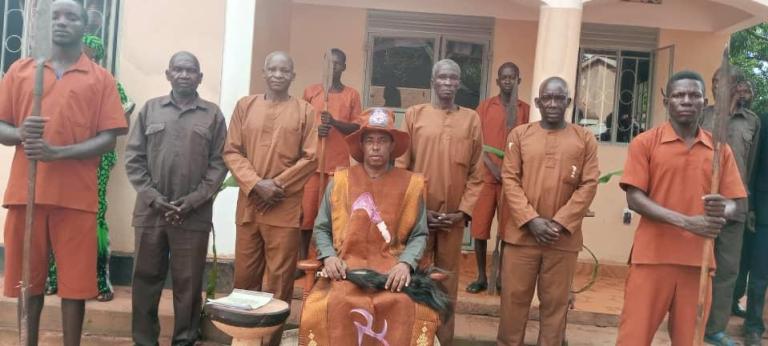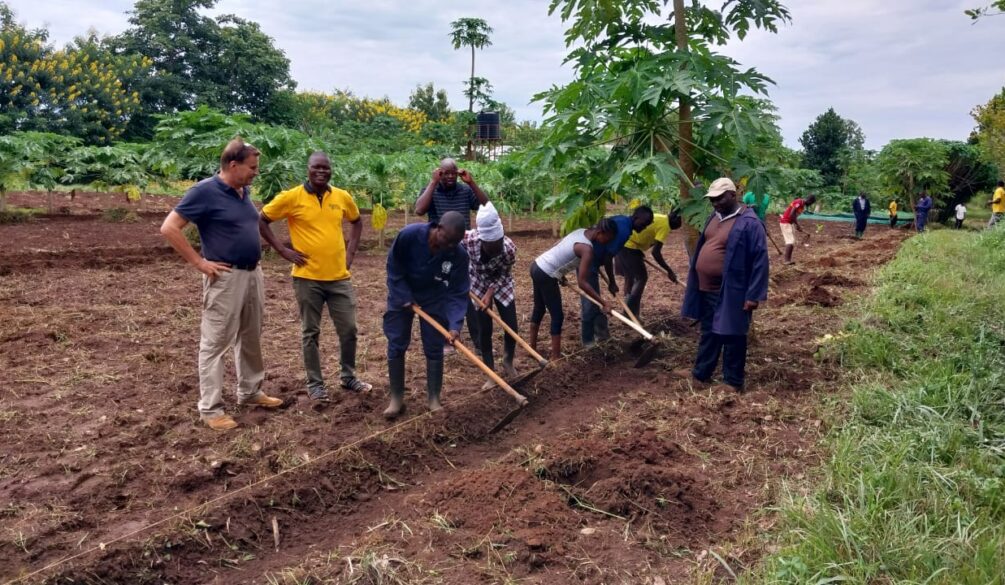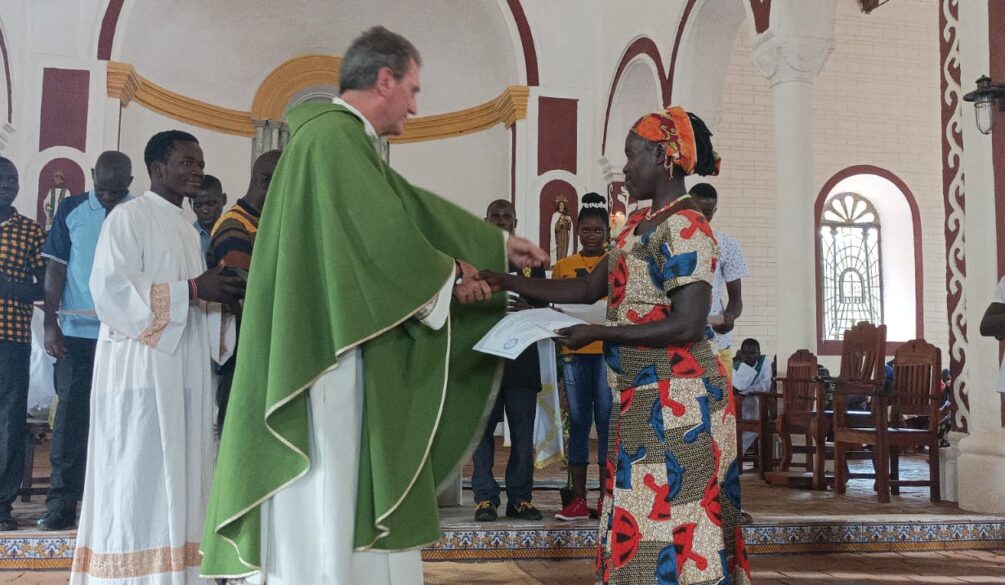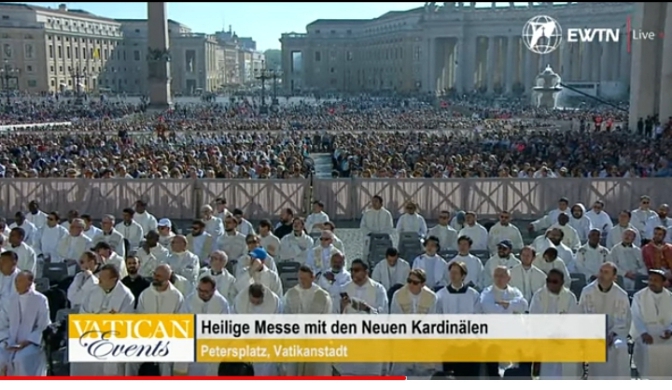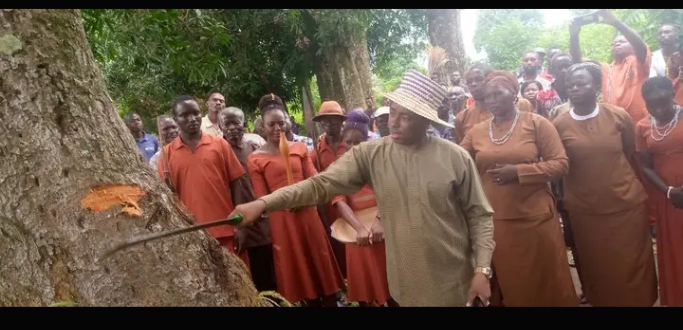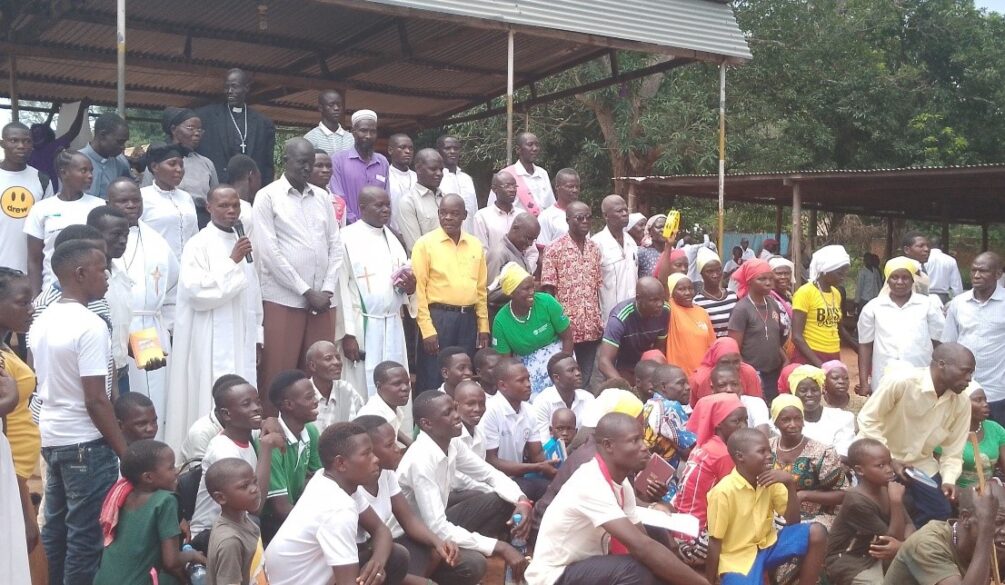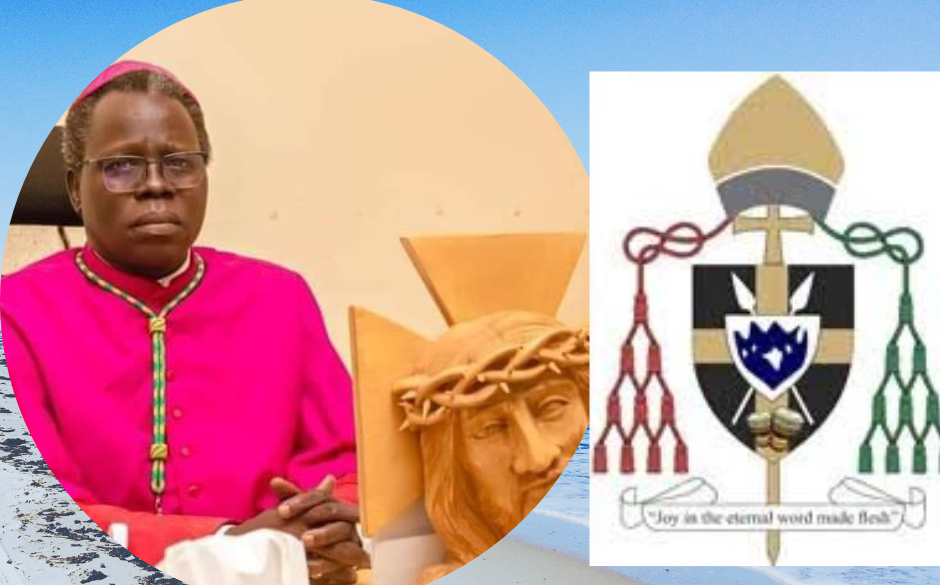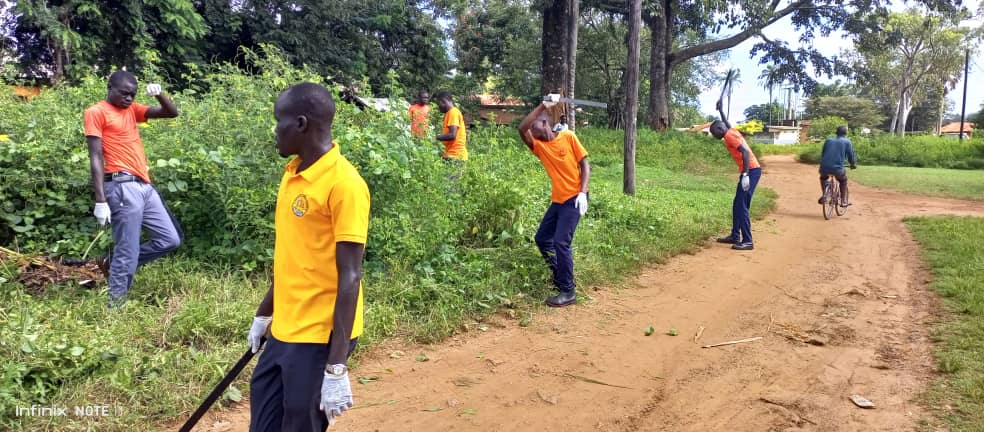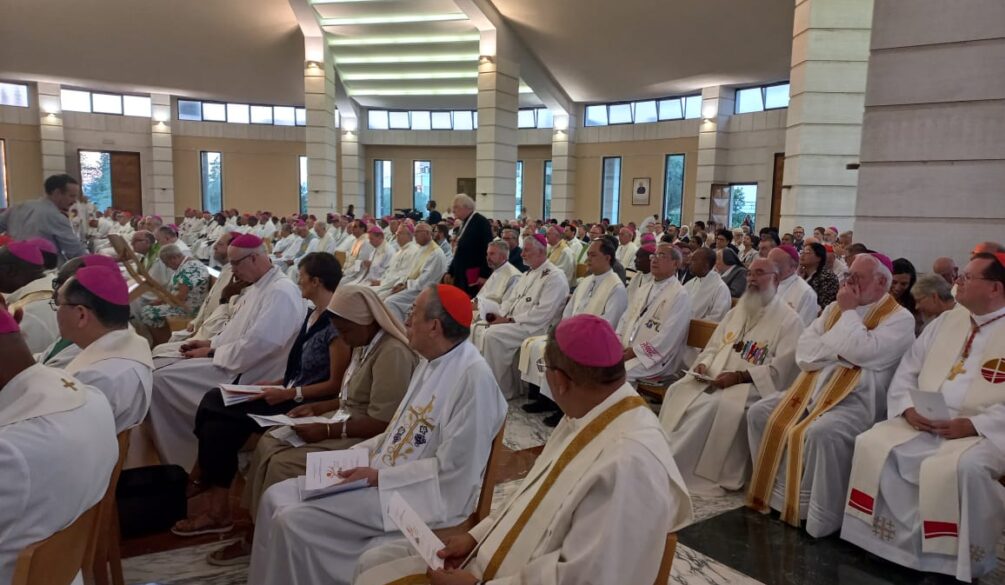2023
St. Tereza Mission Hospital Launches Neonatal Care Unit, Saving Precious Lives
By Baraka John
The administration of St Tereze Mission Hospital in Nzara County has officially launched a Neonatal care unit which was established early this year at the hospital.
Neonatal is a health care unit where infants born prematurely with low birth weight and with medical conditions are admitted.

Speaking at the opening of the unit on Friday, the medical director at St. Tereza Mission Hospital Mr. Mathias Kuichluoch said the unit aims to help the community in the surrounding areas by providing lifesaving treatments to babies born with health-related complications.
According to Mathias, the unit was established in June this year and equipped with two incubators through a partnership with the Catholic medical mission board and the administration of St Tereza Mission Hospital.
He said 57 premature were recorded at the unit between June and September this year, out of which 10 died.
Meanwhile the director general in the state ministry of health, Rose Obede commended St. Tereza Mission Hospital for closing the gaps through the opening of the new healthcare unit at the hospital.
Rose said the health ministry plans to equip St. Tereza with more medical staff to rescue the influx of patients there.
Most of the health complications are now referred to St. Tereza Mission Hospital, and these include patients from Yambio and the surrounding areas.
However, the deputy director of the Catholic Organization for Peace and Development David Ngbaanisa Ariyo acknowledged the State Ministry of Health for always standing firm with St. Tereza Mission Hospital through its projects.

The neonatal care unit is part of any hospital which provides care for babies, soon after they are born.
The major causes of low birth weight and premature birth are attributed to young mothers who conceive at an early age and develop the tendency to give birth before time because their bodies are not fully developed.
2023
King Atoroba Gbudue Advocates Traditional Farming to Preserve Azande Heritage
By Jackson Gaaniko
Azande king in Western Equatoria State, His Majesty King Atoroba Peni Rikito Gbudue, urged all the clans within the kingdom to promote and grow traditional crops.
King Atoroba spoke on Saturday, September 30, while addressing the Avungara clan of the Azande people.
He advised all the clans within the kingdom, especially those in Yambio municipality and other towns, to grow and promote traditional food.
His advice came after the Avungara clan paid a royal visit to the king at the palace over the weekend.
The king said that as Azande people, they should respect the culture of everyone living in the kingdom.
“We should be mindful of what Azande used to eat and grow traditional food. The restoration of the Azande kingdom was to restore, strengthen traditional leadership, and promote the indigenous culture of South Sudan,” said King Atoroba.
He underscored that it’s good to grow cultural foods like Mapese (rice), palm oil, papaya, cassava leaves (Gadia), millet, Simsim, Dura, traditional beans, sugarcane, and some fruits.
King Atoroba tasked the Avungara clan and other tribes in the kingdom to grow traditional foods to sell the culture of the Azande people or the people of Western Equatoria state as a whole.
The King promised to call all the Azande clans to register and support the necessary needs that promote the culture and its diversity.
“We should not forget to farm in order to produce more food to feed our people,” the king stated.
For his part, the Chairperson of the Avungara (Bakungba) Clan, Mr. Albert Maku, said the aim of the royal visit was to meet and greet the king of the Azande Kingdom with the little gifts they delivered.
He said they would heed the king’s advice as they remain committed to growing and promoting cultural food and are ready to obey the king and support it.
Since the restoration of the Azande kingdom, many tribes living within the kingdom have paid their royalty to the kingdom.
Many of our people have forgotten their cultural ways of life, especially how our great-grandparents used to live.
“I am appealing to the kingdom, especially our king, to restore our culture through traditional leaders, church leaders, and youths to how our people used to grow our traditional foods,” Albert appealed.
2023
Mr. John Kimwathi is Elated with the Progress of the SARD Institute Preferring Skills Over Handouts
By Sr. Henriette Anne, FSSA
As the second-year students of Sustainable Agriculture for Rural Development (SARD) Institute continue with their attachment at Riiemze, Mr. John Kamwathi the Principal of SARD Institute is elated with the progress the institute is making after receiving students for their fourth intake describing “Agriculture as their wisest pursuit that will contribute to real wealth, good morals and happiness at the end”.
He added that they managed to get mostly ladies stressing that it has a significant positive impact on society.
“We also managed to have the fourth intake as earlier on informed and now they’re doing well. We managed to get mostly ladies which it’s a positive impact on our society”, he continued, “This is because when you empower a woman you empower the whole community”.
Mr. John acknowledged the presence of their program manager Mr. Brother Kyalo who has been guiding the students on different “organic farming technology”.
Focusing on organic farming and urban setup technologies is particularly relevant in today’s context where sustainable and environmentally friendly practices are essential. By incorporating these methods, one is not only ensuring food security but also promoting eco-conscious agricultural practices, which is crucial for the well-being of the planet.
The principal further said, “We are determined to do our best as far as the training is concerned and having the hope of change in agricultural activities in Western Equatoria. As an institute, we are in full support of our Lord bishop who lets everyone do and practice agriculture as the only way we can be self-sustainable”.
He encouraged all the interested persons to join SARD Institute and to remember that handouts are seasonal and skills and knowledge will lead to food security.
“Handouts are just seasonal but skills and knowledge to our youth and women will lead to food security. We continue to encourage more interested persons to join our institute”.
2023
Bridging Divides: Traditional Healers and Medical Professionals Unite for the Sake of Community Health
By Sr. Henriette Anne, FSSA
A three-day workshop organized by Fr. Alberto for two parishes in Source Yubu Payam, Tombura County bringing together medical professionals and traditional healers to bridge the gap between these two groups and foster cooperation has been described as “one of the initiatives around the Centenary of the evangelization in the area”
“Last long weekend (Thursday to Sunday) we held the first workshop for medical staff and traditional healers of our two parishes, this is one more initiative around the Centenary of the evangelization in this area, trying to reach out to those estranged from the Church, those at the peripheries, according to Pope Francis”, Fr. Alberto narrated.
Fr. Alberto, the assistant Parish Priest of Ave Maria Parish and St. Thomas stated that the aim of organizing and bringing together the health professionals and traditional healers was to “discuss together how to. improve the health of the inhabitants of this area”, he continued “until last weekend they had been despising one another, and the worst affected were the sick people themselves, so we thought that cooperation among them could replace animosity and prejudice”.
Fr. Alberto a member of the Missionary Community of Saint Paul the Apostle noted that 24 people attended the workshop and the dialogue and mutual learning that took place during the workshop enabled the two groups to appreciate each other’s contribution, and they were able to work together and devise strategies for cooperation.
“The dialogue during the three days was edifying and respectful. Both groups learned much from each other”, he added, “The first positive fact is that 11 of them overcame their long-standing suspicion of the church and responded to the invitation and the second positive and unexpected outcome was the appreciation shown by the health professionals, both from the government and the church facilities, towards the contribution of the traditional healers”, Fr. Alberto explained.
He added that during the workshop dramas were performed and distribution of certificates to showcase the benefit of such collaboration to the wider community.
During an online interview with the Rurugene Online Newsletter, the Spanish-born priest disclosed that “Due to the 100-year history since the first Comboni missionaries arrived here, traditional healers were weary of the Church’s intentions towards them. In the past, their chams were burnt, and from the pulpit, they were signaled as superstitious magicians, who terrorized the people, that is why only 10 of them attended the seminar, and others were enquiring how it was and in 2024 we will organize another combined workshop for all the health workers, and the absentees said this time they will attend.
Fr. Alberto further said, “We are inviting all of them to come and reflect together on how to cooperate to improve the health of our people, using their talents and resources to that end. Therefore, we are encouraging those who practice black magic to leave this practice behind and seek God’s blessings”.
2023
Pope Francis Calls for a Merciful and Hospitable Church; at the Opening Mass for Synod
By Sr. Henriette Anne, FSSA
At the opening of the 16th General Synod Assembly, Pope Francis underscored that the primary task of the Synod Assembly is to refocus their gaze on God and to be a Church that looks mercifully upon humanity.
“The primary task of the Synod: to refocus our gaze on God, to be a Church that looks mercifully upon humanity”. He continued, “A united and fraternal Church – or at least one that seeks to be united and fraternal – that listens and dialogues; a Church that blesses and encourages, that helps those seeking the Lord, that benevolently shakes the indifferent, that initiates paths to introduce people to the beauty of faith. A Church centered on God and, therefore, not divided within and never harsh outside”.
In his homily, he reminded the participants that “they are not there to hold a parliamentary meeting but to walk together with the gaze of Jesus, who blesses the Father and welcomes those who are weary and oppressed”.
The Holy Father noted that despite Jesus experiencing rejection and seeing so much hardness of heart around him, he did not become imprisoned by disappointment, he did not become bitter or silence His praise, therefore with this gaze “Lord also invites us to be a Church that, with a joyful spirit, contemplates God’s action and discerns the present. And amid the sometimes turbulent waves of our time, we do not lose heart, do not seek ideological loopholes, do not barricade ourselves behind acquired convictions, do not yield to convenient solutions, and do not let the world dictate the agenda. This is the spiritual wisdom of the Church, summarized with serenity by Saint John XXIII: “It is necessary, before all else, that the Church should never depart from the sacred patrimony of truth received from the Fathers; but at the same time, she must ever look to the present, to the new conditions and new forms of life introduced into the modern world, which have opened new avenues to the Catholic apostolate”.
Reflecting on the welcoming gaze of Jesus, Pope Francis said that Jesus is inviting us to be a “Church that is hospitable, not with closed doors”, saying, “In a complex time like ours, new cultural and pastoral challenges emerge, requiring a warm and kind inner attitude to confront them without fear. In the synodal dialogue, in this beautiful “journey in the Holy Spirit” that we undertake together as the People of God, we can grow in unity and friendship with the Lord to face today’s challenges with His gaze; to become, a Church that “becomes dialogue”. A Church that has a “gentle yoke” (cf. Mt 11:30), which does not impose burdens and repeats to all: “Come, weary and burdened, come, you who have lost your way or feel far away, come, you who have closed the doors to hope: the Church is here for you!” The Church with doors opens to all, all, all”.
He called upon all the participants to walk in the footsteps of St. Francis, “Let us walk together: humble, fervent, and joyful. Let us walk in the footsteps of Saint Francis of Assisi, the Saint of poverty and peace, the “madman of God” who bore the stigmata of Jesus in his body and, to be clothed with Him, stripped himself of everything”.
Pope Francis further said that just like St. Bonaventure tells us that the Crucified once said “Go and repair my Church, so the Synod also serves as a reminder that “our Mother Church always needs purification, needs to be “repaired”, because we are all a People of forgiven sinners – both things: forgiven sinners – always in need of returning to the source that is Jesus and placing ourselves on the paths of the Spirit to reach everyone with His Gospel”.
Admiring the life of St. Francis of Assis, the Holy Father said, “In a time of great struggles and divisions, between temporal power and religious power, between the institutional Church and heretical currents, between Christians and other believers, did not criticize and did not attack anyone, embracing only the weapons of the Gospel, namely humility and unity, prayer, and charity. Let us do the same! Humility and unity, prayer and charity”.
The Pope reminds that the Synod is a place of grace and communion, guided by the Holy Spirit, and encourages everyone to trust in God and be open to His action within the Church.
2023
King Atoroba Rikito Peni Announces Establishment of Royal Palace in Bazungua Payam
His Majesty King Atoroba Rikito Peni in his visit over the weekend to Riimenze, made a pronouncement of Bazungua Payam as an area where his Palace will be established.
King Atoroba together with some elders from the Kingdom assessed areas of Bazungua Payam and identified verse land where the Palace is expected to be constructed, although it’s not clear when the construction process will start.
Speaking at the site His Majesty King Atoroba Peni Rikito Gbudue lauded the people of Bazunguwa Payam under Yambio County for accepting the Kingdom Palace to be established in their area, citing that these will open the way for development in the Payam.
“You people should be aware that the kingdom is coming with a lot of changes such as changing some names of the areas, the introduction of other tribes that may be willing to work with us, burning of witchcraft, bad culture, dressing code among youth, laziness as well”.
Rikito further called upon people addicted to alcohol to refrain from acting and embark on farming to produce more food.
On the other hand, the paramount chief of Bazungua Payam Mathew Nvuru said that his people are very happy with the decision taken by the Kingdom and elders to locate the headquarters of the Palace in the area.
“We from Bazungua are happy and we are ready to support the palace headquarters programs anytime because now we are the blessed child whom our father is coming to stay near our house, we need to own the kingdom by supporting it with Truth not ziréé” (gossip).
Nvuru assured the king of their readiness to start opening the roads and clear all around the allocated area of the palace headquarters voluntarily as part of their support towards the kingdom of Azande people.
Bazungua Payam is one of the 6 Payams under Yambio County located in the East along Maridi Juba road, and it is 7 Kilometers away from Yambio Central Town.
2023
Tambura County Faithful Unite in Prayer for Upcoming Peace Conference
By Waure Eddy
Faithful from different denominations in Tambura County have launched prayers in preparation for the peace conference scheduled for December 2023. The faithful gathered on Tuesday at St Mary Parish Tambura to conduct prayers and ask God to restore permanent peace in Tabmura.
The Chairperson of the Inter-Church Committee in Tambura Rv. Charles from the Lutheran Church said that the aim of organizing the payers is to embrace peace, unity, and forgiveness among the local communities to pave the way for the scheduled peace conference.
Rv. Charles noted that the peace conference is expected to discuss the root cause of the conflict that claimed hundreds of lives and displaced thousands of others.
“As we are waiting for the peace conference in Tambura County this year, we have to start to prepare ourselves now by asking our beloved God for forgiveness which allow us to attend the peace conference with confidence since a lot has been happening for the last two year in Tambura people, we need peace”.
On the other hand, the Commissioner of Tambura County Hon. Mathew Mabenge, applauded the Inter-Church Committee for the initiative and expressed his support towards the process.
“If I commissioner influencing the conflicts in Tambura, God will revile everything, nothing can be hidden in this world, all that is happening in Tambura County will be reviled by God during peace conference if anyone here among us were in the action happen, he/she and you know the root cause God will punish all of us who were involved”, Mabenge stated.
He called on the tribes residing in Tambura County to embrace peace and unity as the County nears the planned peace conference, he retreated his government’s commitment to bring sustainable peace in the county.
“Peace starts right from our hearts and moves out to others; through our understanding, we will develop faster than other countries”.
The Commissioner further urged all the tribes in Tambura County to work together as one family for the betterment of the communities.
The launching of peace conference prayers brought together different denominations operating in Tambura County to join hands to pray for everlasting peace in the area.
2023
Catholic Diocese of Tombura-Yambio Extends Heartfelt Congratulations to Cardinal Ameyu
By Sr. Henriette Anne, FSSA
Bishop Eduardo Hiiboro Kussala, the Bishop of the Catholic Diocese of Tombura-Yambio (CDTY) has congratulated Cardinal Dr. Ameyu Martin Mula on his elevation by Pope Francis.
“On behalf of the Catholic Diocese of Tombura-Yambio, I would like to congratulate you on being elevated to Cardinal and thanks to Pope Francis for blessing South Sudan with its first Cardinal”.
In a Public Consistory held on Saturday, September 30, 2023, at St. Peter’s Square, Vatican City, Pope Francis elevated 20 bishops and a priest to the prestigious rank of Cardinal. Among the newly appointed Cardinals was His Grace Dr. Stephen Ameyu Martin Mula, the Archbishop of the Archdiocese of Juba in South Sudan.
The elevation of Cardinal Martin makes him the second South Sudanese Cardinal after H.G. Cardinal Gabriel Zubeir Wako
Bishop Eduardo added “We are confident that your spiritual leadership will promote the endeavors of the Church in South Sudan with so much to desire, its mission work, and pastoral contributions. We believe that your role as a church leader will be able to guide congregations and churches in your state and beyond for just and peaceful societies, with positive participation”.
One of the Cardinal’s essential roles is participation in the election of a new pope during a conclave, underscoring their influential position within the Catholic Church.
Each of the new cardinals who received the red hat at the consistory on Saturday chose a spiritual motto, giving a window into their spirituality and priorities. For Cardinal Dr. Stephene Ameyu Martin Mulla, “Joy in the Eternal Word Made Flesh” is his spiritual motto and his Episcopal coat of arms includes African drums, a traditional shield, and a golden cross.
“While we admire your contributions as a church in the Archdiocese of Juba, I especially would like to offer my heartfelt prayers for you, I pray that when you take up this new role, God’s empowering love, wisdom, and unity will surround you, as you serve communities and deal with the challenges that church in South Sudan have to address. Congratulations!”, Bishop Eduardo narrated.
2023
Don Bosco Secondary School Students Lead Maridi’s Transformation: A Tale of Youth, Unity, and Environmental Change
By Sr. Henriette Anne, FSSA
The students of Don Bosco Secondary School embarked on a mission that would transform not only their immediate surroundings but also the attitudes of the people living there. Fueled by a shared passion for cleanliness and environmental care, the students organized a massive cleaning event that aimed to breathe new life into their town.
The presence and appreciation expressed by the county education director, representative from the county health department, and the authorities of Maridi are essential for acknowledging the students’ hard work and dedication. Recognizing their efforts in maintaining cleanliness and promoting environmental consciousness serves as a positive reinforcement for the students and motivates them to continue their good work.
Additionally, the support and encouragement from these local authorities play a significant role in inspiring the broader community to adopt similar practices. When respected figures in the community endorse such initiatives, it sends a powerful message to the local residents, encouraging them to follow the example set by Don Bosco students.
This collaborative effort between the students, educational authorities, and local community leaders not only contributes to a cleaner and healthier environment but also fosters a sense of civic pride and responsibility among everyone involved. Such initiatives are essential for building stronger, more responsible communities and nurturing a culture of environmental stewardship.
The story of Don Bosco Secondary School students and their impactful initiative served as a beacon of hope, proving that when a community comes together, guided by the passion of its youth and supported by its leaders, incredible transformations are possible. Maridi became a living example of how harmony in action could turn a dream of a cleaner, healthier environment into a tangible reality, reminding everyone that positive change begins with a single, determined step.
2023
Catholic Synod Retreat Concludes with Calls for Inclusivity and Understanding
By Sr. Henriette Anne, FSSA
At the end of the three-day retreat that preceded the Synod Assembly, the participants were encouraged to listen to one another and to come together despite the different understandings of the Church.
“We may be divided by different hopes, but if we listen to the Lord and to each other, seeking to understand his will for the Church and the world, we shall be united in a hope that transcends all our disagreements”, Fr. Timothy Radcliffe said in a retreat meditation on Oct. 1.
In a live-streamed retreat meditation at Sacrofano Retreat Center, Fr. Radcliffe urged the Synod delegates to embrace their differences, express their doubts, and cast away fears.
The Dominican preacher began the retreat by acknowledging his limitation saying, “I’m deeply aware of my personal limitation. I’m old, white, western, and a man. And I don’t know which is worse. All these aspects of my identity limit my understanding, so I ask for your forgiveness for the inadequacy of my words”.
He further reminded the delegates to “journey towards a Church” where people who “do not yet feel at home in the Church”.
“Our lives are nourished by beloved traditions and devotions. If they are lost, we grieve. But also, we remember those who do not yet feel at home in the Church: women who feel that they are unrecognized in a patriarchy of old white men like me! People who feel that the Church is too Western, too Latin, too colonial. We must journey towards a Church in which they are no longer at the margin but at the center,” Fr. Radcliffe explained.
Reflecting on the sources of divisions in the Catholic Church, he said, “Different understandings of the Church as home tear us apart today. For some it is defined by its ancient traditions and devotions, its inherited structures and language, the Church we have grown up with and love. It gives us a clear Christian identity. For others, the present Church does not seem to be a safe home. It is experienced as exclusive, marginalizing many people, including women: the divorced and remarried. For some, it is too Western, too Eurocentric”.
He also highlighted what Instrumentum Laboris, the document guiding the Synod Assembly says about the gay people and the people in polygamous marriages, “They long for a renewed Church in which they will feel fully at home, recognized, affirmed, and safe. For some the idea of a universal welcome, in which everyone is accepted regardless of who they are, is felt as destructive of the Church’s identity. … They believe that identity demands boundaries. But for others, it is the very heart of the Church’s identity to be open. Pope Francis said, ‘The Church is called on to be the house of the Father, with doors always wide open”
For the priests, the preacher noted that they need a strong sense of identity, an esprit de corps. But who shall we be in this Church which is liberated from clericalism? How can the clergy embrace an identity which is not clerical? This is a great challenge for a renewed Church. Let us embrace it without fear, a new fraternal understanding of ministerial priesthood!”
The three-day retreat ended on Tuesday, 3rd October ushering the participants into the next phase of the journey which is a twenty-five-day synod gathering at Aula Paul VI at the Vatican, from October 4 – 25, 2023.

